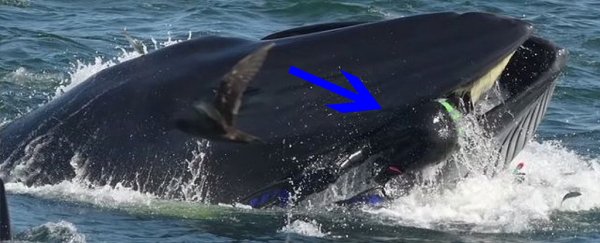It was a chance encounter that neither man nor beast was fully prepared for. Wildlife photographer Rainer Schimpf was simply swimming along, filming a sardine run off the coast of South Africa, when suddenly, the sea began to churn.
"I was trying to get a shot of a shark going through the bait ball," Schimpf said in a video published by Barcroft Animals.
"The next moment, it got dark and I felt some pressure on my hip."
The photographer and dive operator knew instantly where he was. As is clearly shown in the footage below, Schimpf had accidentally wound up in the mouth of a feeding Bryde's whale (Balaenoptera edeni edeni).
Port Elizabeth Harbour's sardine run is the biggest animal migration in the Southern Hemisphere. Here, at certain times of year, gannets, penguins, seals, dolphins, whales and sharks all work together to rally fish into bait balls for easy catching.
Aged 51, Schimpf has been working as a dive tour operator in town for more than 15 years, and each year, he makes sure to document the migration. This time round, he just happened to wind up as bait himself.
There was little Schimpf could have done to avoid the situation. When a mammoth marine creature like a Bryde's whale - which is usually around 14 or 15 metres long (45 or 50 feet) - opens its mouth to feed, it engulfs whatever is in its way.
There was no time for fear. Schimpf could only hold his breath and hope that the whale would not take him deeper. After two seconds or so, his wish was granted.
"The next moment I kind of felt the whale was turning either way, and the pressure was released, and then I was washed out of the mouth," said Schimpf.
"I [came] back up onto the surface where surely I wasn't looking too clever."
Heinz Toperczer, another photographer who was on a nearby boat, managed to capture the terrifying moments.
It's hard to tell who was more surprised by the situation: the human or the whale. After all, this was probably an accidental event that the whale did not see coming either.
"As they come up with their mouths open, they can't really see what is in front of them, and I guess the whale thought it was a dolphin," said fellow dive instructor Claudia Weber-Gebert in the video.
"Whales are not man-eaters. This was no attack, it was not the fault of the whale, and they are really sensitive. They are gentle giants, and it was just an accident."
Besides, even if the whale had wanted to, it wouldn't have been able to swallow Schimpf. As part of the baleen whale family, Bryde's whales have a relatively small esophagus - smaller than the size of a basketball - suited to eat small prey like plankton, krill and sardines, but not something as large as a human.
With a small esophagus and no teeth, it's no doubt one of the best creatures to mistake you for food in the ocean.
"Had it been a shark it would have been two of me, and I don't think that I would have seen anything again," Schimpf later told 9News.
"It is quite the tale to tell … I was spat out by a whale."
